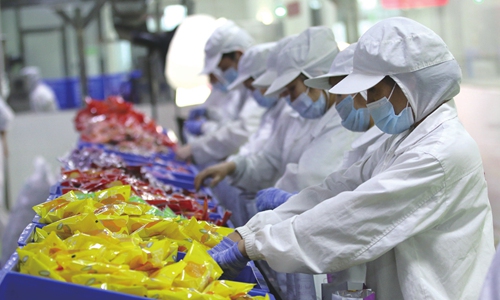
Workers pack bags of Luosifen, or river snail rice noodles, in Liuzhou, South China's Guangxi Zhuang Autonomous Region. Photo: cnsphoto
From duck blood soup to donkey burger, traditional Chinese food served at street food stalls for breakfast, lunch, and dinner have become the "calling card" for many Chinese cities. Now, some Chinese restaurant owners are doubling-down on brand building and streamlining operations, hoping to crack a wider market.
In late July, the Tianjin municipal government issued a framework for standards relating to preparing jianbing guozi, or pancake with crispy fried dough sheet, a popular Chinese food originating in the city, which triggered a heated debate over modern methods of preparing and cooking traditional Chinese food.
The document published by the Tianjin municipal government address the use of dough, the fillings, and seasoning used when making the deep-fried dough sticks which are rolled into a thin pancake.
A Tianjin-based shopkeeper surnamed Wang told the Global Times that many businesses are focused on standardizing operations.
"I have set own standards for the store based on the standards released by the Tianjin municipal government, including ingredients and the size of pancakes," she said, adding that business improved after she standardized the preparation for each snack.
A similar attempt is made 100 kilometers southwest of Tianjin as some food stall owners in Hejian, North China's Hebei Province are making standards for donkey burger. The dish is made up crispy bread filled with donkey meat and soup, which many foodies have called the perfect fusion of meat and flour.
On August 7, Wang Gang, the mayor of Hejian, has urged the city's street food vendors, donkey burger sellers included, to strengthen brand building to share the local delicacy with a wider market.
As early as 2015, the city established a donkey burger industry association, followed by the formulation of "donkey burger processing technical standards."
In addition, market supervision bureau in Nanjing, East China's Jiangsu Province in late June issued a notice on the ingredients used in duck blood soup, requiring the duck content to be greater than 50 percent of the final product, a move that is widely seen as a preparation for the city to apply for the soup to be listed as an item of the world intangible cultural heritage.
The transformation of local snacks represented by jianbing guozi, donkey burger and duck blood soup signal that local governments and street food vendors are making every effort to develop the local snacks into a new growth area and part of a city's unique culture, experts said.
When the whole process is standardized, there is a renewed platform for local snacks to explore the national and even international market, Zhu Danpeng, a veteran food industry analyst, told the Global Times on Tuesday.
"Since the local snacks have developed over time without any mandatory standards, quality can vary greatly. Using local knowledge, and standardizing preparation techniques, can turn these unique snacks into a growth point for the local economy, which is something that the whole industry and local government should work on," Zhu said.
Luosifen, or river snail rice noodles, is an example of the successful transformation from humble street food to a national favorite. From the birth of the domestic first pre-packaged Luosifen company at the end of 2014, it only took six years for the industry's output to exceed 10 billion yuan ($1.5 billion) in 2020, Xinhua News Agency reported.
Originally from South China's Guangxi Zhuang Autonomous Region, the noodle dish became a bestselling food product on Alibaba's e-commerce platform Taobao in 2019.
In 2020, sales of Luosifen on e-commerce platform Tmall jumped by 800 percent year-on-year. In the first quarter of 2021, sales climbed by more than 30 percent, according to data Tmall sent to the Global Times on Tuesday.
Prepared servings of Luosifen are now exported to over 20 countries and regions, and this business has created about 250,000 jobs across the production cycle, Xinhua News Agency reported.
"At present, there has been local and industry standard. As the scale of local snacks economy grows, it is expected that there could be national standard on traditional snacks in the future," Zhu said.
As one of the specialties of West China's Shaanxi, Rou Jiamo, or Chinese meat burger, not only has a high reputation in China, but also gained in popularity aboard. Recently, a meat burger store named Xi Shaoye in Toronto has became popular, with a queue line often hundreds of meters of long, quickly rising to the top of the local review site Yelp's burger list.
Meng Bing, founder of the store, is a native of Shaanxi, and now has more than 70 meat burger stores in Beijing, Hua Shang Daily reported.
Though gaining international influence, there is still a long way to go for the Chinese snack chains in rivaling the likes of KFC and McDonald's in the West, Zhu said.

